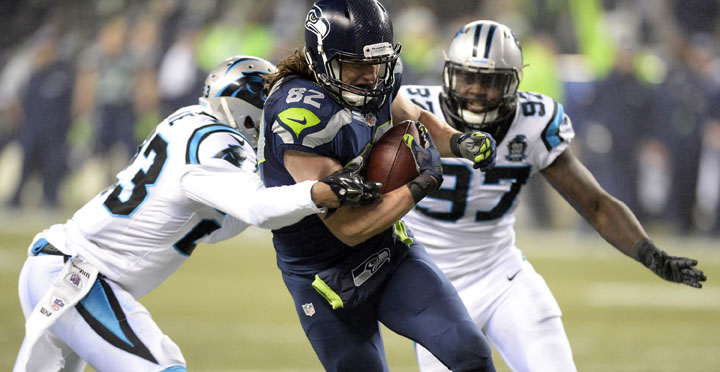NFL: Not-Fair-League
Seattle Seahawks tight end Luke Willson (82) heads to the end zone with a 25-yard touchdown past the Carolina Panthers’ Melvin White (23) and Mario Addison (97) in the second half in NFC Divisional Playoff action at CenturyLink Field in Seattle on Saturday, Jan. 10, 2015. The Seahaws won, 31-17. (David T. Foster, III/Charlotte Observer/TNS)
On Saturday, January 10th, a disgraceful run that never should have existed came to an end. The Seattle Seahawks defeated the Carolina Panthers 31-17, and with that, the playoffs returned to a competition of the elite.
The 7-8-1 Panthers, however, are not a good team. With only 3 wins outside their division, the only reason they ended with a respectable record is that their division was somehow even worse and easy wins against sub-.400 teams boosted their record. Cam Newton finished the season with a passer rating of 82.1 and a touchdown-interception ratio of 18-12.
Despite their glaring issues, the Panthers somehow managed to win their division (the abomination known as the NFC South, which went a mind-numbing 16-35-1 outside division play) and got in as the 4 seed. They even got to play at home, while playoff teams with better records played away from their fan bases. Meanwhile, 5 teams with winning records were left out at the end of the system, including the 10-6 Eagles. Evidently, a system that elevates a team like the Panthers to the upper echelon of the league needs reform.
It’s not all bad news for the NFL playoff qualification structure though. The division-based system has some merit. By giving teams in close proximity more playing time against each other, the system promotes rivalries. Having 2 games a year against the teams that you are in competition for playoff spots creates animosity that adds intrigue to games and benefits the fan experience. It also guarantees that newer teams to the league develop rivalries.
The structure also gives teams with stellar regular season records a significant advantage. Other leagues, such as the NBA and NHL, admit teams into single-elimination brackets where the only advantage to the top seeds is playing games against easier opponents early on in the playoffs. The 12-team NFL format gives the top 4 teams a bye, rewarding these teams for their excellent regular season play.
Clearly, the division-based qualification system has its benefits, but the fact remains that it is inherently unfair because it allows some sub-par teams to squeeze into the playoffs past more qualified teams. Fully solving this issue is impossible within the confines of a division-based system; in that case, the NFL would have to adopt a style similar to the British Premier League, with no conferences or divisions, just a single table whose top teams qualify for the Champions League. There are several changes, though, that the NFL should make to reinforce the integrity of its playoff system, and to prevent colossal mishaps like the Carolina Panthers.
First, the NFL should reduce the number of divisions in each conference. Simple math dictates that larger divisions would have a lower chance of not producing a single worthy team. The NHL and MLB have two and three divisions per conference respectively, and neither deal with issues of teams unfairly qualifying.
The NFL should also remove the added seeding benefits for division winners. With the current system, the division winners automatically become the top four seeds, and the wild card winners become seeds five and six. This season, this led to a bizarre situation where the Panthers were seeded above two teams in the NFC, both 11-5, and got a first-round home game. This is ridiculous. There is no reason a team with a losing record that was unreasonably lucky to even qualify for the playoffs should get any sort of advantage in playoffs. The NFL should remove its protection of division leaders in the playoff format.
Will the NFL end up changing their system in the near future? The Panthers controversy has certainly stirred up debate over its worth. Yet in spite of this, this debate seems to have been met with an unfortunate lack of consideration from the NFL.



